Neoliberal Globalization
Over the years I have read and taught quite a few books on Neoliberal Globalization and neoliberalism . I got into this subject area because I decided to choose Globalization as the minor area concentration for my PhD Comprehensive exams.That one decision to study globalization completely transformed my worldview and has also had a huge positive impact on my teaching and scholarship. This focus on neoliberal globalization has enabled me to study and teach literature within the larger structures of global economic and political systems.
So, here I am adding a list of FIVE books, just in a random order, that helped me understand Neoliberal globalization and that I consider essential for the basic learning about neoliberalism and neoliberal globalization.
1. A Philosophical Critique of Neoliberal Globalization
Bauman, Zygmunt. Globalization: The Human Consequences. Columbia Up, 1998.
At merely 166 pages, this is a gem of a book and explains not only the basic aspects of globalization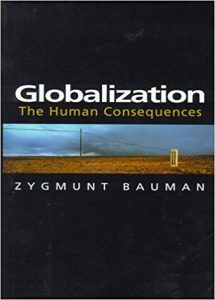 but also its consequences of neoliberal policies on human life, especially in the global periphery. The most important aspect of the book is about how neoliberal globalization is connected to space, time and people’s ability to move and travel around the world. Bauman also argues that global economic elite share a world of common privilege and most of the times those left outside the promise of neoliberalism, the workers, peasants, and the poor, are the ones who pay the price for the excesses of the global economic elite. I highly recommend this deeply philosophical book to all those interested in a concise, yet deeply philosophical, book about neoliberal economics.
but also its consequences of neoliberal policies on human life, especially in the global periphery. The most important aspect of the book is about how neoliberal globalization is connected to space, time and people’s ability to move and travel around the world. Bauman also argues that global economic elite share a world of common privilege and most of the times those left outside the promise of neoliberalism, the workers, peasants, and the poor, are the ones who pay the price for the excesses of the global economic elite. I highly recommend this deeply philosophical book to all those interested in a concise, yet deeply philosophical, book about neoliberal economics.
My favorite sentence from the book, and I am quoting from memory:
If all the billionaires of the world kept only five million each for themselves and gave the rest away, more than two billion people in the world would move from abject poverty to the middle class. But chances are we will see pigs fly before that happens!
2. Neoliberal Globalization and Rise of Fundamentalisms
Rapley, John. Globalization and Inequality: Neoliberalism’s Downward Spiral. Lynne Rienner, 2004.
John Rapley might not be one of the heavy weights of economic theory, but this one books has 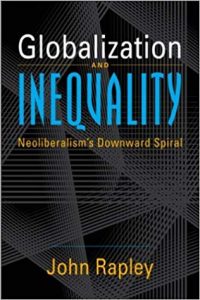 taught me a lot about the nature and functioning of the neoliberal regime and its points of crisis. Rapley relies on Gramsci’s concept of hegemony to discuss how economic regimes create hegemony and gain “willing consent” of the people within the logic of a given economic regime. And when any such regime comes into crisis, when people see through the ideology, then a regime can nolnegr sustain itself so it either must become coercive or renegotiate the consent of the people. Rapley explains the two important functions of political economy and national governments that are deeply impacted by the neoliberal policies:
taught me a lot about the nature and functioning of the neoliberal regime and its points of crisis. Rapley relies on Gramsci’s concept of hegemony to discuss how economic regimes create hegemony and gain “willing consent” of the people within the logic of a given economic regime. And when any such regime comes into crisis, when people see through the ideology, then a regime can nolnegr sustain itself so it either must become coercive or renegotiate the consent of the people. Rapley explains the two important functions of political economy and national governments that are deeply impacted by the neoliberal policies:
[qcld-ilist mode=”one” list_id=”2119″ upvote=”off” disable_lightbox=”false” column=”1″]
Neoliberalism, Relative Inequality, and Rise of Fundamentalisms
Rapley also suggests that people usually understand economic and social inequalities as natural, but when the relative inequality gets too high, people become more sensitive to the issue: The rich getting richer and the poor getting pourers. This relative inequality creates the ideal situation for the people’s revolt against the dominant regime. Furthermore, since state no longer takes care of the people, through the safety net, private religious organizations take over these functions and can lay a claim to their loyalties. Rapley can point to a clear causal connection between neoliberalism and the rise of various kind of fundamentalist organizations all over the world.
So, for anyone venturing into understanding the nature and impact of neoliberals economics, this book would be a wonderful resource.
3. Understanding Neoliberal Globalization from Within
Stiglitz, Joseph. Globalization and Its Discontents. Norton 2003.
Not only is this a book by a Nobel Laurette in Economics, it also relies on Stgilitz’s experience as a 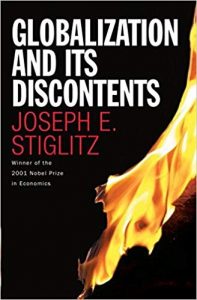 World Bank official and his critique of the IMF from his practical vantage point. He even points to some punitive practices of IMF that are not founded in real economics but rather deeply connected to IMF’s efforts in safeguarding short-term interest of their shareholders.
World Bank official and his critique of the IMF from his practical vantage point. He even points to some punitive practices of IMF that are not founded in real economics but rather deeply connected to IMF’s efforts in safeguarding short-term interest of their shareholders.
Anyone interested in a well theorized book on neoliberal economics with a lot of practical examples and comparative analysis should put this book on his or her list.
Stiglitz has also just recently published an updated version of the book, which I plan to read soon. Anyway, Stiglitz would be a good scholar to put on your list if you really want to follow the past and contemporary debates about neoliberal globalziation.
4. Neoliberalism Globalization and the Movement Against it
Bello, Walden. Capitalism’s Last Stand: Deglobalization in the Age of Austerity. Zed Books, 2013.
If you want a book by a scholar of globalization with anti-globalization, activist credentials, then this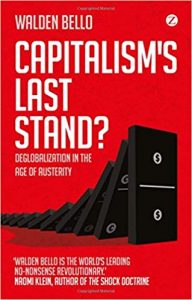
is the book for you. In clear and concise prose Bello explains the rise of neoliberalism, in the aftermath of 80s “stagflation” and its consequences for the developing world.
This book is also essential for all those who hope to imagine and create a different world and want to learn about the struggles of World Social Forum against the powerful focus of neoliberal globalization.
If you like this book, you will also find Bello’s other books quite useful and that might also lead you to learn a but more about the World Social Forum, the latest gathering of anti-globalizations group every year!
Check out World Social Forum Here!
5. Critique of Neoliberal Globalization from the Developing World
Amin, Samir. Capitalism in the Age of Globalization: The Management of Contemporary Society. Zed Books, 2014.
If you want one that foresaw (The first edition of the book was published in 1997) the likely contours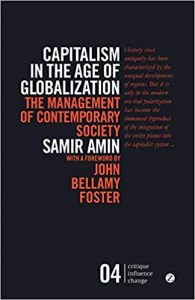 of the future global economic order after the collapse of Soviet Union, then this is the book for you.
of the future global economic order after the collapse of Soviet Union, then this is the book for you.
A brilliant and incisive voice for a more just economic world, Amin provides his insights about the nature of neoliberal capital and its consequences for the developing world. He also offers deep insights about how best to understand and counter the imperatives of neoliberal economic system.
Conclusion
These are some of my favorite books to learn about various aspects of neoliberal globalization and neoliberal economics. These are not the only books on the subject, and I will eventually post a whole list of books on neoliberalism, but if you are just beginning to be interested in this field, any of these books could be useful in your learning process.


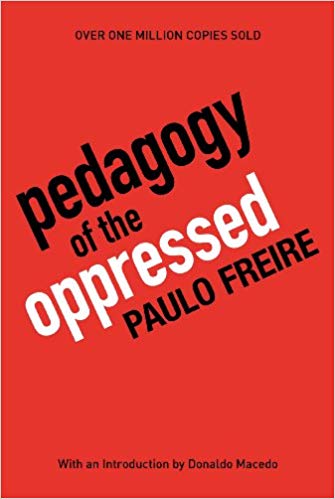
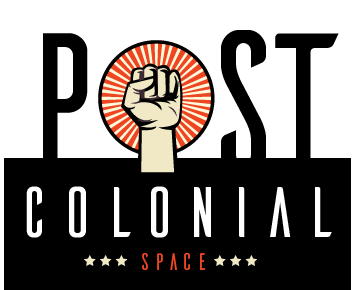
Leave A Comment